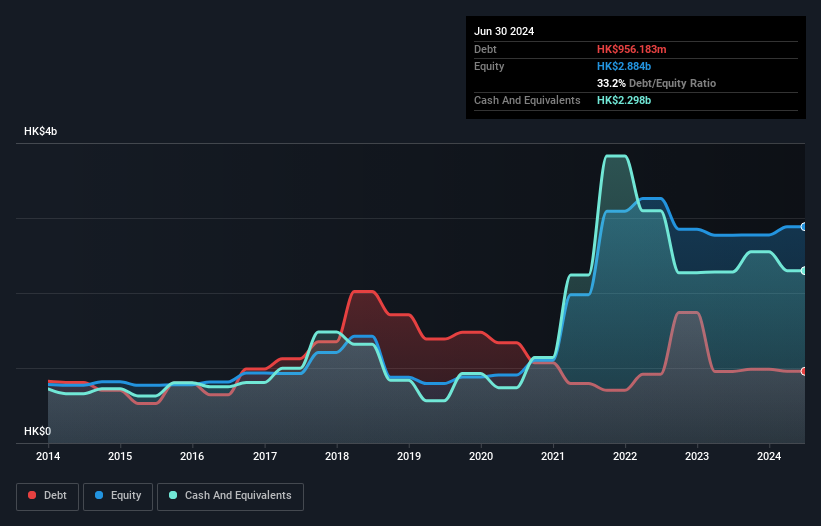- Hong Kong
- /
- Tech Hardware
- /
- SEHK:1263
These 4 Measures Indicate That PC Partner Group (HKG:1263) Is Using Debt Safely
Legendary fund manager Li Lu (who Charlie Munger backed) once said, 'The biggest investment risk is not the volatility of prices, but whether you will suffer a permanent loss of capital.' When we think about how risky a company is, we always like to look at its use of debt, since debt overload can lead to ruin. We note that PC Partner Group Limited (HKG:1263) does have debt on its balance sheet. But is this debt a concern to shareholders?
When Is Debt A Problem?
Debt and other liabilities become risky for a business when it cannot easily fulfill those obligations, either with free cash flow or by raising capital at an attractive price. In the worst case scenario, a company can go bankrupt if it cannot pay its creditors. However, a more common (but still painful) scenario is that it has to raise new equity capital at a low price, thus permanently diluting shareholders. Of course, plenty of companies use debt to fund growth, without any negative consequences. When we think about a company's use of debt, we first look at cash and debt together.
Check out our latest analysis for PC Partner Group
What Is PC Partner Group's Debt?
As you can see below, PC Partner Group had HK$956.2m of debt, at June 2024, which is about the same as the year before. You can click the chart for greater detail. However, it does have HK$2.30b in cash offsetting this, leading to net cash of HK$1.34b.

How Strong Is PC Partner Group's Balance Sheet?
The latest balance sheet data shows that PC Partner Group had liabilities of HK$2.47b due within a year, and liabilities of HK$57.6m falling due after that. On the other hand, it had cash of HK$2.30b and HK$926.0m worth of receivables due within a year. So it can boast HK$698.7m more liquid assets than total liabilities.
This surplus strongly suggests that PC Partner Group has a rock-solid balance sheet (and the debt is of no concern whatsoever). With this in mind one could posit that its balance sheet means the company is able to handle some adversity. Simply put, the fact that PC Partner Group has more cash than debt is arguably a good indication that it can manage its debt safely.
Although PC Partner Group made a loss at the EBIT level, last year, it was also good to see that it generated HK$300m in EBIT over the last twelve months. When analysing debt levels, the balance sheet is the obvious place to start. But it is PC Partner Group's earnings that will influence how the balance sheet holds up in the future. So when considering debt, it's definitely worth looking at the earnings trend. Click here for an interactive snapshot.
Finally, while the tax-man may adore accounting profits, lenders only accept cold hard cash. While PC Partner Group has net cash on its balance sheet, it's still worth taking a look at its ability to convert earnings before interest and tax (EBIT) to free cash flow, to help us understand how quickly it is building (or eroding) that cash balance. Over the last year, PC Partner Group actually produced more free cash flow than EBIT. That sort of strong cash generation warms our hearts like a puppy in a bumblebee suit.
Summing Up
While we empathize with investors who find debt concerning, you should keep in mind that PC Partner Group has net cash of HK$1.34b, as well as more liquid assets than liabilities. The cherry on top was that in converted 666% of that EBIT to free cash flow, bringing in HK$2.0b. So we don't think PC Partner Group's use of debt is risky. The balance sheet is clearly the area to focus on when you are analysing debt. But ultimately, every company can contain risks that exist outside of the balance sheet. For example - PC Partner Group has 2 warning signs we think you should be aware of.
At the end of the day, it's often better to focus on companies that are free from net debt. You can access our special list of such companies (all with a track record of profit growth). It's free.
New: Manage All Your Stock Portfolios in One Place
We've created the ultimate portfolio companion for stock investors, and it's free.
• Connect an unlimited number of Portfolios and see your total in one currency
• Be alerted to new Warning Signs or Risks via email or mobile
• Track the Fair Value of your stocks
Have feedback on this article? Concerned about the content? Get in touch with us directly. Alternatively, email editorial-team (at) simplywallst.com.
This article by Simply Wall St is general in nature. We provide commentary based on historical data and analyst forecasts only using an unbiased methodology and our articles are not intended to be financial advice. It does not constitute a recommendation to buy or sell any stock, and does not take account of your objectives, or your financial situation. We aim to bring you long-term focused analysis driven by fundamental data. Note that our analysis may not factor in the latest price-sensitive company announcements or qualitative material. Simply Wall St has no position in any stocks mentioned.
About SEHK:1263
PC Partner Group
An investment holding company, designs, develops, manufactures, and sells computer electronics.
Flawless balance sheet established dividend payer.
Market Insights
Community Narratives



